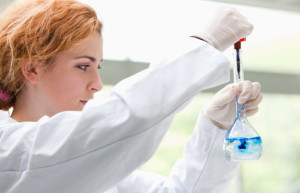Before the 1950s and 60s when mass manufacturing became the mainstream source of prescription drugs, most medications were compounded. However, compounding has been making a comeback so that pharmacies can cater to patients with individual requirements.
In recent years, compounding has not been only performed by pharmacists. “As the pharmacy profession has progressed from a dispensing role to more clinically focused positions, technicians are increasingly being placed in less traditional roles in the pharmacy,” stated Angela Cassano, PharmD, BCPS (in her 2010 Pharmacy Purchasing & Products article “Maximizing Technician Roles in Sterile IV Compounding”).
“Given the current economic climate surrounding health care, taking full advantage of the skills of well-trained, qualified technicians can be a cost effective solution to handling many non-clinical functions within the pharmacy,” said Cassano, adding that sterile compounding can be one of these functions, so that pharmacists can spend more time on patient care.
What is Compounding?
Compounding involves creating prescription medications and drugs that are customized to meet a patient needs, such as those who have problems swallowing pills, who have allergies, who experience side effects from conventional forms, who are particular about certain flavors, and more.
“A compounding pharmacist can adjust the strength of a medication, avoid unwanted ingredients, add flavor to make the medication more palatable, and prepare medications using unique delivery systems.”
“The primary reason for compounding is to avoid patient noncompliance, which means the patient is either unable or unwilling to use the medication as directed,” stated certified pharmacy technician Luey Rawlinson in an interview with StGeorgeUtah.com. “Many patients are allergic to preservatives or dyes, or require a dosage that is different from the standard drug strengths. A compounding pharmacist can adjust the strength of a medication, avoid unwanted ingredients, add flavor to make the medication more palatable, and prepare medications using unique delivery systems.”
Training
 According to the Pharmacy Sterile Compounding Summit’s “Summary of a Stakeholder Meeting” (February 2013), since 2001 there have been 20 serious errors committed by compounding pharmacies, leading to 1022 adverse events and 75 deaths.
According to the Pharmacy Sterile Compounding Summit’s “Summary of a Stakeholder Meeting” (February 2013), since 2001 there have been 20 serious errors committed by compounding pharmacies, leading to 1022 adverse events and 75 deaths.
It is essential that all of the pharmacy technicians who compound medications are adequately trained. There are a number of avenues for pharmacy technicians to receive the skills and relevant credentials required. For example, several colleges and universities offer continuing education courses, as does the National Healthcareer Association (NHA).
Additionally the Professional Compounding Centers of America (PCCA) offers comprehensive and aseptic compounding courses to pharmacists who are members with the PCCA as well as their pharmacy technicians.
CE Credits
If you are a pharmacy technician, even if you are not currently working in a compounding pharmacy, completing compounding training is an excellent way to increase your expertise for more specialized roles. Certain compounding courses can also count towards the CE credits required by your state board and/or to maintain your CPhT certification.



